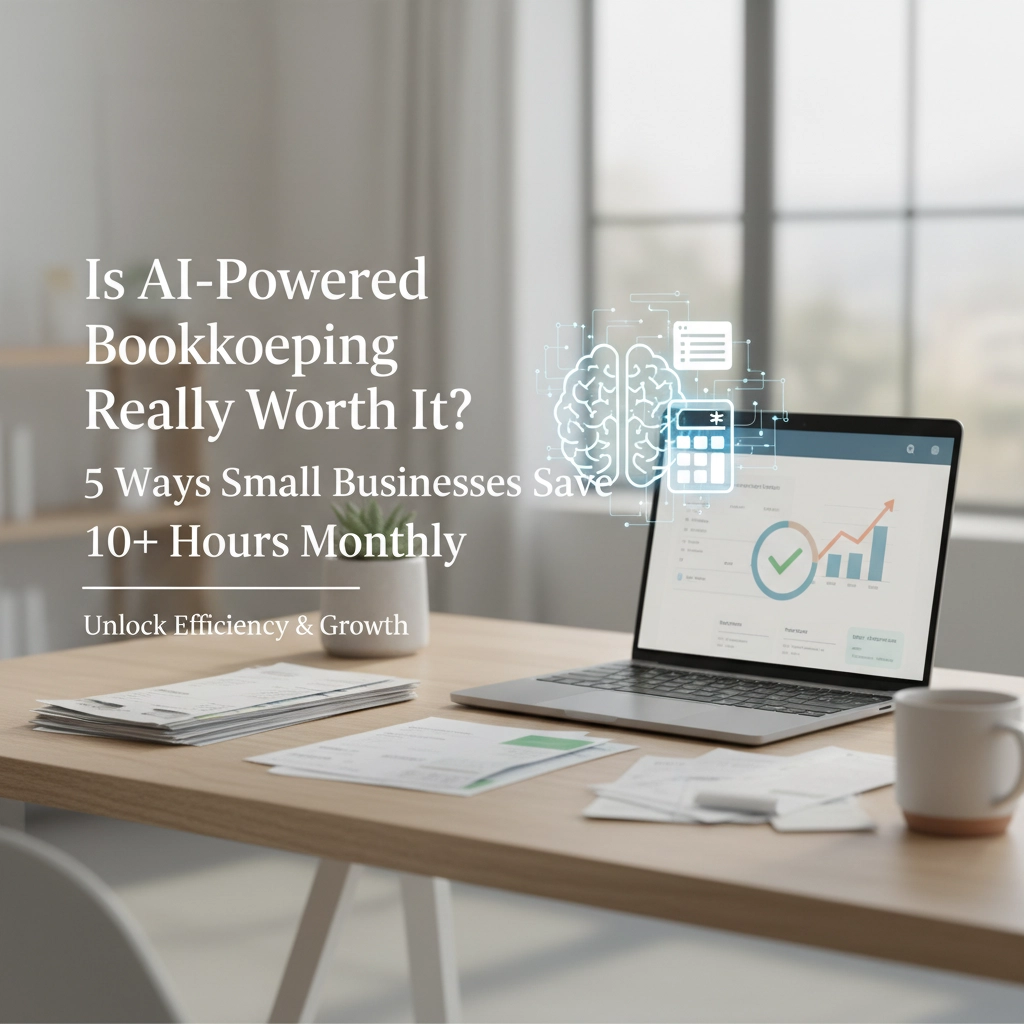
Is AI-Powered Bookkeeping Really Worth It? 5 Ways Small Businesses Save 10+ Hours Monthly
Small business owners are drowning in paperwork, and the numbers don’t lie. The average small business owner spends over 40 hours per month on bookkeeping tasks that could be automated. Meanwhile, 86% of businesses earning over $1 million annually have already made the switch to AI-powered financial management tools, and they’re seeing massive returns on their investment.
AI-powered bookkeeping isn’t just a trendy buzzword anymore. It’s a game-changing solution that’s saving small businesses an average of 57 hours per month while dramatically improving accuracy and financial visibility. But is it really worth the investment for your business? The short answer is absolutely yes, and here’s exactly how it can transform your financial operations.
The Real Cost of Traditional Bookkeeping
Before diving into the benefits, consider what traditional bookkeeping actually costs your business. Beyond the obvious expenses like software subscriptions or bookkeeper fees, there’s the hidden cost of your time. Every hour you spend categorizing transactions, reconciling accounts, or generating reports is an hour not spent growing your business, serving customers, or developing new products.
Traditional bookkeeping methods also introduce significant error risks. Manual data entry mistakes can cascade through your entire financial system, leading to inaccurate reports, tax complications, and poor business decisions based on faulty data. AI-powered systems eliminate most of these human errors while providing real-time insights that keep you ahead of potential issues.
5 Ways AI-Powered Bookkeeping Saves 10+ Hours Monthly
1. Automated Data Entry and Transaction Processing (25-30 Hours Saved)
The biggest time sink in traditional bookkeeping is manual data entry, but AI systems achieve 95% automation in this area. Instead of spending hours each week entering transactions from bank statements and receipts, AI-powered platforms automatically connect to your bank accounts and credit cards through secure APIs.
Machine learning algorithms analyze each transaction and automatically categorize it based on merchant names, amounts, and historical patterns. What used to take days of tedious work now happens instantly and accurately. The system learns your business patterns over time, becoming more precise with each transaction it processes.
2. Streamlined Invoice Processing (15-20 Hours Saved)
Invoice management becomes effortless with 90% automation capabilities. AI systems use intelligent optical character recognition (OCR) to scan and extract key information from invoices, vendor names, amounts, dates, and account codes, regardless of format or layout.
The technology automatically matches invoices to corresponding payments in your bank accounts, eliminating the manual reconciliation process that traditionally consumed hours each month. You’ll spot discrepancies immediately rather than discovering them weeks later during month-end closing procedures.
3. Intelligent Expense Categorization and Tracking (8-10 Hours Saved)
Expense categorization reaches 85% automation with AI systems that learn from your historical data. The technology recognizes patterns in your spending and automatically sorts expenses into appropriate categories, office supplies, travel, marketing, utilities, and more.
Beyond basic categorization, AI systems provide anomaly detection that flags unusual transactions for review. This proactive approach catches potential fraud early and ensures nothing slips through the cracks. You’ll spend minutes reviewing exceptions rather than hours categorizing every single expense.
4. Automated Financial Reporting and Analytics (10-12 Hours Saved)
Report generation becomes a one-click operation with 80% automation. AI systems continuously synthesize your transaction data into comprehensive profit and loss statements, cash flow reports, and expense breakdowns by department or category.
The real power lies in the intelligent insights these systems provide. Natural language generation creates written explanations of financial trends, highlighting significant changes in revenue, expenses, or cash flow patterns. You’ll understand not just what happened to your finances, but why it happened and what it means for your business strategy.
5. Real-Time Reconciliation and Compliance Management (Additional Time Savings)
Traditional month-end reconciliation becomes obsolete with AI systems that perform continuous account matching. The technology identifies discrepancies immediately rather than waiting for monthly closing procedures, eliminating the scramble to balance books at month-end.
Compliance management also becomes automated, with systems that stay current on tax law changes and reporting requirements. This proactive approach prevents costly mistakes and ensures you’re always prepared for tax season or financial audits.
How AKOR Services Helps You Implement Smarter Recordkeeping
At AKOR Services, we understand that implementing new technology can feel overwhelming, especially when it comes to something as critical as your financial records. That’s why we take a personalized approach to help small businesses transition to AI-powered bookkeeping systems.
Our team evaluates your current bookkeeping processes and identifies the areas where automation will provide the greatest time savings and accuracy improvements. We don’t just recommend software, we help you implement systems that integrate seamlessly with your existing business operations.
We work with businesses to ensure their AI bookkeeping setup captures all necessary data for tax preparation, financial reporting, and strategic planning. Our goal is to give you confidence in your financial data while freeing up your time to focus on what you do best, running your business.
Comparing Traditional vs. AI-Powered Bookkeeping
The differences between traditional and AI-powered bookkeeping extend far beyond time savings. Traditional methods are reactive, you discover problems after they’ve already impacted your business. AI systems are proactive, identifying issues before they become costly mistakes.
Traditional bookkeeping provides historical snapshots of your financial position, while AI systems offer real-time visibility into cash flow, profitability, and spending patterns. This immediate insight enables better decision-making and helps you respond quickly to changing business conditions.
Cost-wise, many small business owners worry about the upfront investment in AI bookkeeping technology. However, when you factor in the time savings, improved accuracy, and strategic insights these systems provide, the return on investment becomes clear within the first few months of implementation.
Getting Started with AI-Powered Bookkeeping
The transition to AI-powered bookkeeping doesn’t have to happen overnight. Start by identifying your biggest time drains: whether that’s invoice processing, expense categorization, or report generation. Focus on automating one area at a time to minimize disruption to your current operations.
Most AI bookkeeping platforms offer trial periods or demonstration sessions that let you experience the time savings firsthand. Take advantage of these opportunities to see how the technology handles your specific business transactions and reporting needs.
Remember that successful implementation requires some initial setup time to train the AI system on your business patterns and preferences. However, this investment pays dividends quickly as the system becomes more accurate and efficient with each transaction it processes.
The Future of Small Business Financial Management
AI-powered bookkeeping represents more than just a technological upgrade: it’s a fundamental shift in how small businesses approach financial management. Instead of spending hours on routine tasks, you’ll have more time for strategic planning, customer relationships, and business growth initiatives.
The technology continues evolving, with new capabilities like predictive analytics and automated tax preparation on the horizon. Early adopters position themselves to take advantage of these advances while competitors struggle with outdated manual processes.
Your financial data becomes a strategic asset rather than a necessary burden. With real-time insights and automated processes handling routine tasks, you can make informed decisions quickly and confidently.
The question isn’t whether AI-powered bookkeeping is worth it: it’s whether you can afford to fall behind while your competitors gain these competitive advantages. The businesses thriving in today’s market are those that embrace technology to work smarter, not harder.
Ready to discover how AI-powered bookkeeping can transform your business operations? Let’s explore solutions tailored to your specific needs and industry requirements.
Contact Information:
Website: https://akorservices.com/thebooks/
Phone: (360) 334-3373
Email: info@akorservices.com
Allen Beck
AKOR Services
Allen@akorservices.com
© AKOR Services, 2025. All Rights Reserved.
















